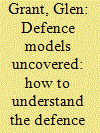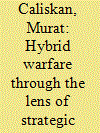|
|
|
Sort Order |
|
|
|
Items / Page
|
|
|
|
|
|
|
| Srl | Item |
| 1 |
ID:
164702


|
|
|
|
|
| Summary/Abstract |
This paper describes four different styles, or models, of defence organisation that can be found worldwide. The framework outlined in the paper has been designed to help politicians, diplomats and officials understand better their own system so they can improve it, or to understand the system of others so they can produce better interoperability. The four styles (or models) suggested are mutually exclusive as each has defining factors that mark them out from the other three. The models are rational focusing upon warfighting; emotional, the antithesis of rationality where choices of the day dominate; politically dominant, where a political solution is chosen for the country such as conscription; and militarily dominant, where the whole defence system is controlled by the military with no proper civilian oversight. Each model is hard to sustain and most countries tend towards one style being dominant with elements of the others.
|
|
|
|
|
|
|
|
|
|
|
|
|
|
|
|
| 2 |
ID:
164707


|
|
|
|
|
| Summary/Abstract |
The VOSTOK-2018 strategic field training exercise (FTX) that took place in mid-September 2018 rehearsed forces’ integration and combat preparedness across multiple strategic directions. Regarding combat readiness, the research question outlined in this paper relates to whether the General Staff experimented with mission-command - a key component of Russia’s modern military thinking. The answer is clearly no: operational creative manoeuvring hardly featured during the VOSTOK-2018 drills for clearly identified reasons. At the systemic level, little room was left for initiatives since the drills focused on implementing and testing command and control (C2) systems. At the structural level, VOSTOK-2018 was not oriented towards mission-command but ‘mission-control’ and streamlining centralised decision-making processes down to the tactical level. At the symbolic level, free play was not exercised due to the participation of China in the drills, and the necessity to impress Chinese military observers.
|
|
|
|
|
|
|
|
|
|
|
|
|
|
|
|
| 3 |
ID:
164703


|
|
|
|
|
| Summary/Abstract |
The press, analysts, and officials took close notice of the Russian strategic-level field-exercise (FTX) organized in mid-September 2018. Of note was its immense geographic size. It ranged from the Southern Military District, across nine distinct training ranges, with naval operations in the Sea of Okhotsk, the Bering Sea, and in the Avacha, and Kronotsky bays in Kamchatka. Whilst many commentators focused on the challenge of effecting span-of-control over the exercise; or debated the actual number of troops, Defense & Security Analysis asked a number of experts of the Russian army whether they detected any hint of experimentation in the areas of mission-command and free-play in the FTX-phase of the exercise. Five experts contributed short analytical essays on whether such approaches were detected, let alone actually used.
|
|
|
|
|
|
|
|
|
|
|
|
|
|
|
|
| 4 |
ID:
164698


|
|
|
|
|
| Summary/Abstract |
Illicit procurement networks often target industry in developed economies to acquire materials and components of use in WMD and military programs. These procurement networks are ultimately directed by elements of the proliferating state and utilize state resources to undertake their activities: diplomats and missions, state intelligence networks, and state-connected logistical assets. These state assets have also been utilized to facilitate the export of WMD and military technologies in breach of sanctions. While used in most historic proliferation cases, their role has seen limited consideration in the scholarly literature. This article seeks to systematically contextualize state resources in proliferation networks, arguing that their use lies between state criminality and routine activity in support of national security. Considering the competitive advantages of these assets compared to similar resources available in the private sector, the article argues that nonproliferation efforts have caused states to change how they use these resources through an ongoing process of competitive adaptation.
|
|
|
|
|
|
|
|
|
|
|
|
|
|
|
|
| 5 |
ID:
164700


|
|
|
|
|
| Summary/Abstract |
Hybrid warfare is the latest of the terms/concepts that have been used within the defence community in the last three decades to label contemporary warfare. It has been officially adopted in the core strategic documents of NATO, EU and national governments and has already inspired many articles, policy papers and books; however, this paper is unique in the sense that it analysis the hybrid warfare concept through the lens of strategic theory. It is argued that hybrid warfare does not merit the adoption as a doctrinal concept. Strategic theory instead, which lies at the nexus of all dimensions of warfare, provides a better viewpoint to approach contemporary warfare. It concludes that efforts should be directed towards exploring warfare under the light of eternal principles instead of proving the emergence of new types of warfare.
|
|
|
|
|
|
|
|
|
|
|
|
|
|
|
|
| 6 |
ID:
164701


|
|
|
|
|
| Summary/Abstract |
Most countries put significant amounts of time and effort in writing and issuing high-level policy documents. These are supposed to guide subsequent national defence efforts. But do they? And how do countries even try to ensure that they do? This paper reports on a benchmarking effort of how a few “best of breed” small- to medium-sized defence organisations (Australia, Canada, and New Zealand) deal with these issues. We find that most countries fail to link goals to resources and pay limited attention to specific and rigorous ex-ante or post-hoc evaluation, even when compared to their own national government-wide provisions. We do, however, observe a (modest) trend towards putting more specific goals and metrics in these documents that can be – and in a few rare cases were – tracked. The paper identifies 42 concrete policy “nuggets” – both “do’s and don’ts” – that should be of interest to most defence policy planning/analysis communities. It ends with two recommendations that are in line with recent broader (non-defence) scholarship on the policy formulation-policy implementation gap: to put more rigorous emphasis on implementation (especially on achieving desired policy effects), but to do so increasingly in more experiential (“design”) ways, rather than in industrial-age bureaucratic ones (“PPBS”-systems).
|
|
|
|
|
|
|
|
|
|
|
|
|
|
|
|
| 7 |
ID:
164708


|
|
|
|
|
| Summary/Abstract |
Analyzing Russia’s VOSTOK 2018 strategic level field-exercise (or “strategic manoeuvers”) in the West from a Western perspective is hard. A key reason for this is that Western and Russian perspectives on war and the use of military force have grown apart. By this, Russia is still focused on traditional notions of mass, i.e. massed troops and firepower brought to bear on the enemy to achieve tactical/operational victory. Conversely, most Western states have turned their thinking to effect precision engagement, using high-tech situational awareness and C4 capabilities with small(er), professional and highly lethal forces. For the last 25 years, much of the Western focus on warfare has highlighted force-protection and the avoidance of collateral damage in expeditionary operations that have little to do with vital national security interests. This deviates completely from the Russian perspective: causing maximal casualties and destruction in order to prevail in the battlefield (to wit: observe Eastern Ukraine). In short, today the very expensive Western precision warfare meets attrition warfare and decisive battles would enjoin to produce the ultimate use of violence.
|
|
|
|
|
|
|
|
|
|
|
|
|
|
|
|
| 8 |
ID:
164704


|
|
|
|
|
| Summary/Abstract |
The article outlines the essential role of free play elements in various types of exercises for the development of in-depth and practical military professionalism. It thereafter argues why such use of free play contradicts the military science founded Russian Way of War.
|
|
|
|
|
|
|
|
|
|
|
|
|
|
|
|
| 9 |
ID:
164706


|
|
|
|
|
| Summary/Abstract |
Russian military prefers and exercises differently compare to the Western planning and execution philosophies with mission command allowed and appreciated in sub unit levels only. “Vostok-2018” provided a lot of evidences Russians using de-centralised execution in the sub-unit levels and at the same time centralised control at levels of units and formations.
|
|
|
|
|
|
|
|
|
|
|
|
|
|
|
|
| 10 |
ID:
164705


|
|
|
|
|
| Summary/Abstract |
The latest Russian strategic level field-exercise, VOSTOK-2018, grew notorious with its officially reported overwhelming numbers of participating troops, pieces of equipment moved, units maneuvered, and even the states involved – China was in, too! Nonetheless, this exercise again raises an important point that has not registered in most analyses, i.e. the rarely asked question if Russians are at all capable of, or willing to, apply free-play in the conduct of the field-exercise, instead of their infamous highly-scripted military exercises, designed to impress the VIP visitors, rather than train troops and grow commanders.
|
|
|
|
|
|
|
|
|
|
|
|
|
|
|
|
|
|
|
|
|